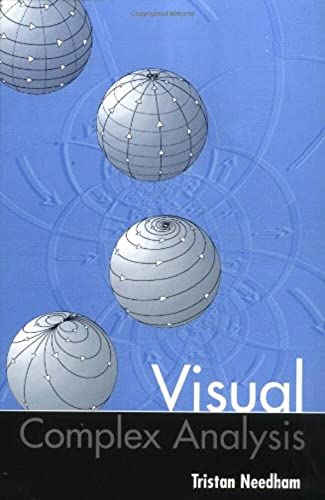| Visual Complex Analysis |
|
Author: Tristan Needham Important Note:I have been informed that there is a second edition in preparation Visual Complex Analysis: 25th Anniversary Edition The estimated release date for this new edition is Feb 6th 2023. Also that the Kindle of the first edition is not an official one and should be avoided if at all possible. An official Kindle version of the second edition is being made available and should be of good quality and it may even be published before the paper edition. A few months ago I read and reviewed Tristan Needham's amazing Visual Differential Geometry and Forms, awarding it a 5-star rating ans describing it as "The best math book I have read in a long time..." This made me go back to the author's first book on Complex Analysis. I was hoping for the same level of insight but, while it is a really good book, it just isn't in the same league. However don't let this initial verdict put you off because there is still plenty to recommend in this book and lots to enjoy. I have to admit that I have sat through more than one course on complex analysis and actually used the topic as theory and applied via programming. From classical complex analysis I also found a lot of interest in the more "modern" topics that grow from the Mandelbrot set. It is worth saying that this book doesn't deal with such exotica - it is mostly about the extension of real functions to the complex plane and how calculus can be recast. It is a very big book and it covers the key ideas of complex analysis and a great many applications. It covers so much that it is unlikely you are going to find it all engaging. The preface gives three possible paths though the book - traditional, vector field and non-Euclidean. Personally I'd avoid complex analysis as an approach to vector fields and non-Euclidean geometry as these are better covered in Visual Differential Geometry and Forms. The trouble with the complex analysis approach to these subjects is that you are limited to 2D. I read it in linear fashion, from start to finish, but how others approach it is a matter of choice. The book starts off with some standard history and a look at some remarkable, but well-known, ideas such as Euler's formula and generally the strange way complex numbers make trigonometric relationships so easy. From here we move on from algebra to functions - power series, the standard functions and the strange idea of multifunctions. Next there is an in-depth look at the Mobius transformation. This is a topic that I have previously puzzled over - why are these rational functions so important. Having read the section now I know, but I'm still thinking about it. Perhaps the most rewarding idea in the book is that the complex derivative has to be an "amplitwist", Needham's own word. In a standard course you restrict your attention to functions that have derivatives which are independent of how you aproach a point. This is good way to meet the complex derivative, but to discover that this is that same as the derivative being everywhere, a scaling and a rotation - an amplitwist - is a really interesting idea and worth reading the book for. Unfortunately from here we go over the usual ground, conformal is the same as analytic, critical points, and the Cauchy-Riemann conditions, without anything that is as new or as exciting. But this is not a new theory that admits much inovation.
|
The Reign of Botnets (Wiley)
Author: David Sénécal This book is subtitled 'Defending against Abuses, Bots and Fraud on the Internet', which is a big and important topic. |
Algorithmic Thinking, 2nd Ed (No Starch Press) Author: Dr. Daniel Zingaro |
| More Reviews |

